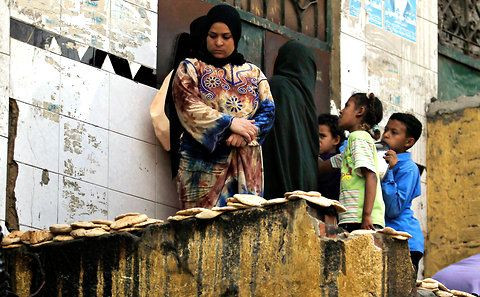$4.8 Billion IMF Loan Gives Morsi's Egypt A Confidence Boost

CAIRO -- It's been an eventful week for Egyptian President Mohammed Morsi, who has faced a spate of violent demonstrations over the weekend by protesters angry at what they call a power grab by the country's leader.
On Wednesday, his government succesfully brokered a cease-fire between Israel and Hamas in the Gaza Strip, gaining international credibility. And alongside those negotiatons, Morsi worked behind the scenes to push through a landmark agreement with the International Monetary Fund that gives Egypt the money it needs to jump-start sorely needed economic reform.
The preliminary agreement reached on Tuesday for a $4.8 billion, low-interest loan from the IMF is a signal to global investors that Egypt, which had been trying for months to attract international capital, is serious about economic recovery.
The deal, a hotly debated issue in Egypt for months, is meant to alleviate the country's liquidity crunch, ease currency-depreciation risks, and boost investor confidence following 20 months of economic strain since the January 2011 uprising that toppled President Hosni Mubarak and brought Morsi to power.
“An IMF agreement for a loan to Egypt provides stability, confidence, and international support for fiscal consolidation and structural reform,” said Paul Gamble, a London-based anaylist with the ratings agency Fitch.
Prime Minister Hesham Qandil said the IMF agreement will help increase Egypt's foreign-currency reserves to $19 billion by the end of the next fiscal year, according to a statement on the prime minister’s website.
The Egyptian central bank’s foreign currency-reserves have reached the critically low level of $15 billion, less than the value of three months of imports. Those reserves were at $36 billion in December 2010, but have been depleted since as foreign direct investment, exports, and tourism revenue declined following the popular uprising.
The agreement will also help release a total of $14.5 billion in funding commitments from other international bodies and partners, including the U.S., which were on hold pending the success of the IMF loan negotiations.
“It’s a very positive sign, at least for the short term,” says Sebastien Henin, a vice president at National Investor, an investment-management firm in Abu Dhabi. “The availability of external financing will allow for a gradual adjustment of the economy and substantially reduce Egypt's cost of borrowing.”
Egypt previously requested $3.2 billion from the IMF, but negotiations for that loan fell apart in June amid a power struggle between the Muslim Brotherhood-backed Freedom and Justice Party, whose candidate Morsi had just won the presidential election, and the Supreme Council of the Armed Forces, or SCAF, which had been the country's de facto ruler after Mubarak's ouster.
In August, Egypt's Finance Ministry made an official request to the IMF for the $4.8 billion loan, increasing the amount to reflect the country’s growing liquidity needs.
Speaking at a conference in Cairo in October, Egyptian officials indicated they had reached an understanding on the terms of the loan, but were still lacking broad political support and “societal consensus” to finalize an agreement.
The loan, and the IMF itself, remain unpopular in Egypt as symbols of foreign interference, reflecting a pushback against decades of pro-Western policies favored by Mubarak's regime. Egyptian performer Yasser El Manawahly dedicated a satirical song to the IMF. “Oh Monetary Fund, poison in honey,” he sings in a video posted on YouTube. “You help me build my home, oh Monetary Fund.”
Like the IMF's loans to other countries, the one to Egypt carries conditions: The international body wants to see economic reforms in exchange for the low-interest money (it is being lent at a 1.06% interest rate, a far lower rate than Egypt could have obtained in the bond market.)
The government has a two-year economic program, including fiscal reforms, plans to cut subsidies and tackle the country’s tax system, which investors view as instrumental to shoring up economic growth.
The plan includes a deficit-reduction target that would cut it from almost 11 percent of gross domestic product in fiscal year 2011-12 to 8.5 percent of GDP in FY 2013-14, according to an IMF statement posted on the Finance Ministry’s website.
“The envisaged deficit reduction will help alleviate the public-debt burden and free up financing to support social spending and private-sector growth, the foundation for rapid job creation and socially balanced growth in the medium term,” said Andreas Bauer, the head of the IMF’s Middle East and Central Asia division.
“Fiscal reforms are a key pillar under the program,” Bauer said. “Authorities plan to reduce wasteful expenditures, including by reforming energy subsidies and better targeting them to vulnerable groups.” Fuel subsidies account for an estimated 20 percent of government spending in Egypt, where a gallon of premium-grade gasoline costs on average $1.73, according to Bloomberg News. By way of comparison, the most recent Lundberg Survey pegs the U.S. average price of regular-grade gasoline at $3.47.
Meanwhile, authorities intend to raise revenue through tax reforms, including by increasing tax rates for higher incomes and by broadening the general sales tax to turn it into a “full-fledged value-added tax.”
The IMF's executive board will review the preliminary agreement on Dec. 19. Its formal approval is necessary to finalize the loan and distribute the first tranche of the money.
As for approval by Egypt's public, that hasn't come yet. While the loan agreement is a significant milestone in Egypt’s transition from an authoritarian regime to an economically successful democracy, political uncertainty remains, with the drafting of a new constitution still pending and new parliamentary elections yet to be announced. “Effective communication will be vital to gain popular acceptance in the turbulent prevailing political environment,” said Gamble, the Fitch analyst.
© Copyright IBTimes 2024. All rights reserved.





















